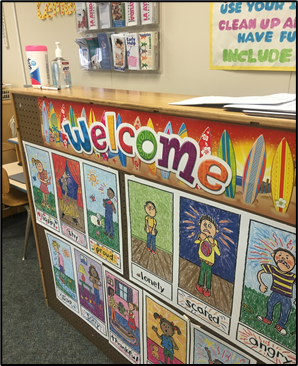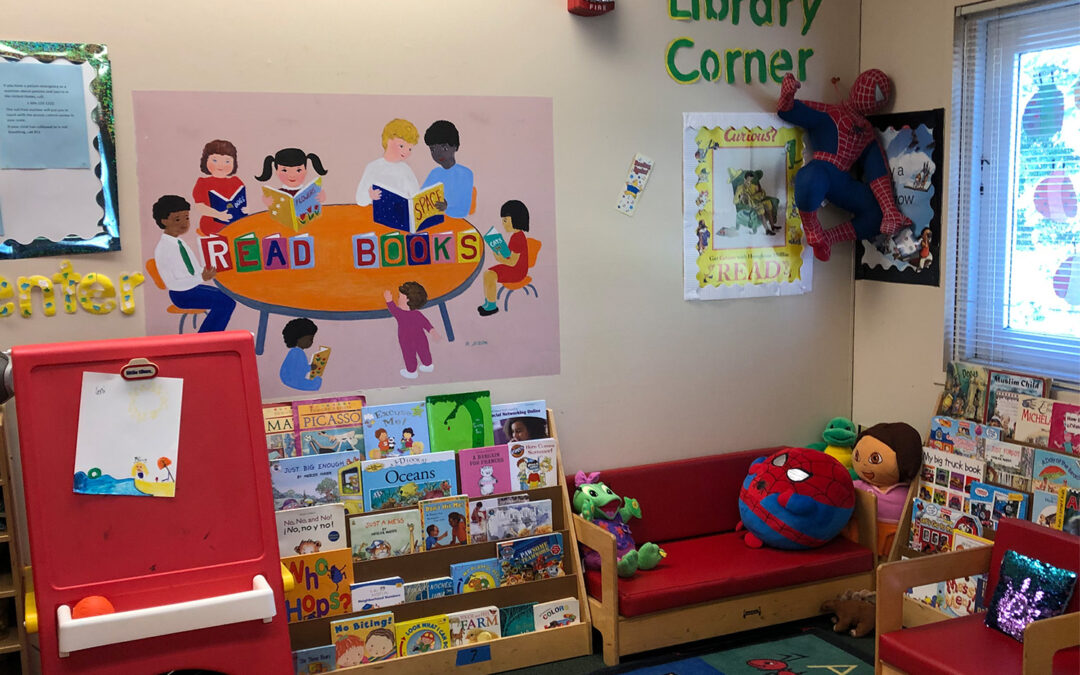
by North Shore Child & Family Guidance Center | Oct 31, 2022 | Anton Media
Roslyn Heights, NY, October 4, 2022 — Family court hearings are often contentious, and they are certainly no place for young ears. Luckily, with the Children’s Center at Nassau County Family Court, parents and guardians have a safe place to bring children from infants to 12-year-olds while they are conducting court business.
North Shore Child & Family Guidance Center, which runs this important program, is holding a fundraiser to support the Children’s Center at Nassau County Court on Thursday, October 27, 2022. The event will be held at Tesoro’s Ristorante, 967 Old Country Road, Westbury, from 5:30 to 8:30 p.m., and will feature cocktails, music and a buffet dinner.
“The Children’s Center at Nassau County Family Court provides a valuable service because it allows children to be insulated from the stress involved in the horror of family court litigation,” said John M. Zenir, Esq., co-chair of the fundraiser. “Just imagine a six-year-old sitting in a public waiting room outside of a courtroom not knowing what is happening. What fear and dread that child must feel! Instead, he or she can go to the Children’s Center and play with toys, read a book and have a snack while being attended to by qualified professionals.”
According to co-chair Allison Cacace, children can be traumatized if they hear their loved ones arguing in court. “The Children’s Center at Nassau County Family Court provides a safe, nurturing environment for children while their parents or other caretakers sort out their legal affairs,” said Cacace, Director of Tobay Day School and owner of Casino One Limousines. “It is extremely important that we raise awareness and funds for this invaluable service that makes a positive impact on children and is also greatly beneficial to those who can’t afford to pay for childcare during court sessions.”
“The mission of the Women’s Bar includes promoting the fair and equal administration of justice,” said Cherice P. Vanderhall Wilson, President of the Nassau County Women’s Bar Association, which is co-hosting the benefit. “The Children’s Center eliminates childcare as a barrier to justice and provides a resource for those who need it while they seek assistance from one the County’s most important courts.”
Dr. Nellie Taylor-Walthrust, Director of the Guidance Center’s Leeds Place, said, “The Children’s Center not only provides childcare, but it’s also an early learning environment, and each child leaves with a book to take home. We are so grateful to John, Allison and the Nassau County Women’s Bar
Association for their dedication and support. We hope that all who care about children will join us on October 27th!”
To purchase tickets or sponsorships, email mespichan@northshorechildguidance.org, visit www.northshorechildguidance.org or call 516-626-1971, ext. 309.
Caption: The Children’s Center provides a safe, nurturing environment for children while their parents are in court.
About Us:
As the preeminent not-for-profit children’s mental health agency on Long Island, North Shore Child & Family Guidance Center is dedicated to restoring and strengthening the emotional well-being of children (from birth – age 24) and their families. Our highly trained staff of psychiatrists, psychologists, social workers, vocational rehabilitation counselors and other mental health professionals lead the way in diagnosis, treatment, prevention, training, parent education, research and advocacy. The Guidance Center helps children and families address issues such as depression and anxiety; developmental delays; bullying; teen pregnancy; sexual abuse; teen drug and alcohol abuse; and family crises stemming from illness, death, trauma and divorce. For nearly 70 years, the Guidance Center has been a place of hope and healing, providing innovative and compassionate treatment to all who enter our doors, regardless of their ability to pay. For more information about the Guidance Center, visit www.northshorechildguidance.org or call (516) 626-1971.

by North Shore Child & Family Guidance Center | Oct 31, 2022 | In The Media, Long Island Business News

by North Shore Child & Family Guidance Center | Oct 24, 2022 | Ask The Guidance Center Experts, Blank Slate Media, Blog, In The Media
In this monthly column, therapists from North Shore Child & Family Guidance Center answer your questions on issues related to parenting, mental health and children’s well-being. To submit a question, email communications@northshorechildguidance.org.
Question: Now that life has gotten back to some semblance of normal, my kids (ages 4, 9 and 11) are eager to go trick-or-treating this year. I’m thrilled for them, but the problem is that my little one is absolutely terrified of scary costumes.
As much as he wants to enjoy Halloween activities like his big brother and sister, he’s so frightened that I’m not sure we can take him out. He’s even said he doesn’t want to go to school that day. Any suggestions?
–Costume Conundrum
Dear Costume Conundrum: Halloween is one of the most exciting holidays of the year for youngsters. Candy, dressing up, parties at school—what’s not to love?
But your little one isn’t alone in his fear. For children around three to five years of age, and sometimes even older, the ghoulish costumes and yard displays can be overwhelming and very scary. But be assured, that’s a natural part of their development.
Luckily, most preschools and even elementary schools advise parents to avoid the scary kinds of costumes, so the schools themselves are typically safe zones. But once your son heads out to trick-or-treat, he’s likely to confront some frightening sights.
Of course, you know your son, so you’re the best judge of how scared he is likely to be. But as with all parenting issues, preparing ahead of time and anticipating any problems is the wisest strategy. Some tips:
- Let your son express his fears and reassure him in a calm voice that it’s OK to have those feelings.
- Play a game where your child scares you, and then laugh about it.
- Show him costumes online, so he’ll have an idea of what to expect.
- Do some crafts at home that create ghosts and other Halloween décor. Explain that any scary lawn displays are made of fabric and paint, just like the crafts you made together.
- Some children don’t like something like a mask covering their faces (even though they’ve had to deal with a different kind of mask for some time), so you might want to avoid costumes with masks.
- If he is frightened by costume masks on other people, put one on yourself and take it off to show him that you are still there!
- If your older kids are wearing potentially scary costumes, let your young one watch as they put on their makeup or masks, so he can gradually see how his big brother and sister transformed into the witch or warlock—and that it’s still them under the disguise.
- Make a visit to your local library and ask the librarian for books that help children see that Halloween is full of pretend things—some scary and lots of them just plain fun! One great choice: The Little Old Lady Who Was Not Afraid of Anything.
If your son loves his costume but when Halloween arrives, his mood changes and he refuses to wear it, try a compromise. Let him bring the costume to school instead of putting it on before he goes, or have him just wear part of the outfit. It’s definitely not something worth having a power struggle over, so if he refuses to wear it, let it go. It’s a perfect case of knowing when to pick your battles.
North Shore Child & Family Guidance Center, Long Island’s leading children’s mental health agency, is seeing clients both remotely via telehealth platforms and in person, depending on the clients’ needs. To make an appointment, call 516-626-1971 or email intake@northshorechildguidance.org.

by North Shore Child & Family Guidance Center | Oct 18, 2022 | Blog
Volunteers Spruce Up Our Nature Nursery.
Young children learn important lessons through nature, and nothing beats hands-on experiences. That’s why we were so grateful when 11 employees from National Grid came to our Marks Family Right from the Start 0-3+ Center as part of their volunteer day of service, called Project C.
The volunteers spent the entire day planting, painting, repairing and whole-heartedly doing whatever needed to be done to spruce up the Nature Nursery at the Right from the Start Center, which had been left largely unattended during the pandemic.

“We are so grateful to all the National Grid volunteers for working so hard and with such great spirits to beautify our Nature Nursery and surrounding areas,” said Dr. Sue Cohen, Director of the Right from the Start Center, where the Guidance Center serves its youngest clients and their families. “The Nancy Marks Nature Nursery continues to provide our young children and their parents with an opportunity to enjoy their natural environment using exploratory, hands-on stations and activities, such as musical instruments, water, paints and graduated steps. Having a creative outdoor space to use during therapy and group sessions allows our therapists to engage children in a different way. The youngsters who have experienced this area love all that is has to offer and look forward to regularly returning.”

National Grid’s Alexandra Paoli, who was in charge of the project at the Guidance Center site, worked side by side with her mother, Michele Paoli, who has worked at the utility for 25 years. “Thousands of National Grid employees volunteer on this ‘Day of Service,’ which takes place at locations all across Long Island, upstate New York and New York City,” said Alexandra, a recent graduate of Penn State University and Associate Analyst, Community Customer Engagement. “My mother knew about the great work done at the Guidance Center, so when she suggested it be one of the sites of our statewide volunteer initiative, it was a natural choice.”

Therese Sullivan, National Grid’s Director of Operations Enablement, has participated in both Project C Day of Service events. “I was glad to volunteer for the Guidance Center because mental health is so important, especially helping children at an early age,” she said. “It is a great resource for families, and I’m proud that our company supports these efforts.”
If your company would like to discuss opportunities to volunteer at the Guidance Center or support our mission in other ways, contact Lauren McGowan at LMcGowan@northshorechildguidance.org or call her at (516) 626-1971, ext. 320.
Photo: A dedicated group of National Grid employees (pictured here with North Shore Child & Family Guidance Center staff) did an amazing job volunteering at the nonprofit’s Nature Nursery.
About North Shore Child & Family Guidance Center:
As the preeminent not-for-profit children’s mental health agency on Long Island, North Shore Child & Family Guidance Center is dedicated to restoring and strengthening the emotional well-being of children (from birth – age 24) and their families. Our highly trained staff of psychiatrists, psychologists, social workers, vocational rehabilitation counselors and other mental health professionals lead the way in diagnosis, treatment, prevention, training, parent education, research and advocacy. The Guidance Center helps children and families address issues such as depression and anxiety; developmental delays; bullying; teen pregnancy; sexual abuse; teen drug and alcohol abuse; and family crises stemming from illness, death, trauma and divorce. For nearly 70 years, the Guidance Center has been a place of hope and healing, providing innovative and compassionate treatment to all who enter our doors, regardless of their ability to pay. For more information about the Guidance Center, visit www.northshorechildguidance.org or call (516) 626-1971.
About National Grid: National Grid (NYSE: NGG) is an electricity, natural gas, and clean energy delivery company serving more than 20 million people through our networks in New York and Massachusetts. National Grid is focused on building a path to a more affordable, reliable clean energy future through our fossil-free vision. National Grid is transforming our electricity and natural gas networks with smarter, cleaner, and more resilient energy solutions to meet the goal of reducing greenhouse gas emissions.
For more information, please visit our website, follow us on Twitter, watch us on YouTube, like us on Facebook and find our photos on Instagram

by North Shore Child & Family Guidance Center | Oct 17, 2022 | In The Media, Long Island Business News
A benefit for the Children’s Center at Nassau County Family Court is set for Thursday, Oct. 27, from 5:30 p.m. to 8:30 p.m. at Tesoro’s Ristorante in Westbury.
The center serves as a safe place to bring children, from infants to 12 years old, while parents conduct court business, which can often be contentious and even traumatizing for kids.
But the center, which is run by North Shore Child & Family Guidance Center, helps kids avoid those kinds of experiences.
“The Children’s Center at Nassau County Family Court provides a valuable service because it allows children to be insulated from the stress involved in the horror of family court litigation,” John Zenir, co-chair of the fundraiser said in a statement.
“Just imagine a six-year-old sitting in a public waiting room outside of a courtroom not knowing what is happening,” Zenir added. “What fear and dread that child must feel! Instead, he or she can go to the Children’s Center and play with toys, read a book and have a snack while being attended to by qualified professionals.”
“The Children’s Center at Nassau County Family Court provides a safe, nurturing environment for children while their parents or other caretakers sort out their legal affairs,” Allison Cacace, co-chair of the event and director of Tobay Day School and owner of Casino One Limousines. “It is extremely important that we raise awareness and funds for this invaluable service that makes a positive impact on children and is also greatly beneficial to those who can’t afford to pay for childcare during court sessions.”
“The mission of the Women’s Bar includes promoting the fair and equal administration of justice,” said Cherice P. Vanderhall Wilson, President of the Nassau County Women’s Bar Association, which is co-hosting the benefit. “The Children’s Center eliminates childcare as a barrier to justice and provides a resource for those who need it while they seek assistance from one the County’s most important courts.”
Nellie Taylor-Walthrust, director of the Guidance Center’s Leeds Place, said that the Children’s Center” not only provides childcare, but it’s also an early learning environment, and each child leaves with a book to take home.”








